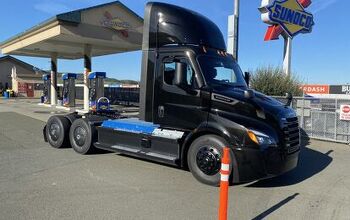Are We Headed Towards a High-Octane Future? The EPA Thinks So

Low-octane gasoline. It was great for the detuned boat anchors found under the hoods of 1970s Malaise-era barges, because you weren’t having fun, anyway.
The future of gasoline-powered vehicles is all about high-compression engines and ever-stricter environmental regulations, meaning gasoline with higher octane than today’s pumps can provide could be on the horizon.
In an interview with Automotive News, Chris Grundler, director of the Environmental Protection Agency’s office of transportation and air quality, said higher-octane gas is a key part of the push for greener engines.
Speaking at a recent auto industry conference, Grundler said the EPA is collecting data about the emissions-reducing benefits of higher hi-test fuel. Don’t expect the regulator to approve European-style gas (which is about four to six octane higher than U.S. blends) anytime soon. Grundler said that the EPA has a mandate to keep the status quo for several years.
“After 2025, we should talk about what the future fuels should look like and what is the optimum mix of vehicle and fuel technologies,” Grundler told AN. He added, “There are some provisos. For us to intervene and set fuel standards, we need to show that there is an air quality benefit or that, absent regulations, that it is somehow inhibiting the after-treatment or other parts of the vehicle. And that the benefits outweigh the costs.”
Engine displacements are dropping as automakers seek efficiency-minded power gains through turbocharging, direct injection and ever-higher compression.High-tech engines generally like hi-test gas.
Dan Nicholson, General Motors’ vice president of global propulsion systems, claims that higher octane fuel could boost gas mileage by five percent, but there’s a catch. It’s costs more, and most customers would rather avoid it. However, there’s reason to believe that greater production of hi-test fuel, backed by an EPA mandate, would lower prices.

More by Steph Willems
Latest Car Reviews
Read moreLatest Product Reviews
Read moreRecent Comments
- V8fairy Headlights that switch on/off with the ignition - similar to the requirement that Sweden has- lights must run any time the car is on.Definitely knobs and buttons, touchscreens should only be for navigation and phone mirroring and configuration of non essential items like stereo balance/ fade etc>Bagpipes for following too close.A following distance warning system - I'd be happy to see made mandatory. And bagpipes would be a good choice for this, so hard to put up with!ABS probably should be a mandatory requirementI personally would like to have blind spot monitoring, although should absolutely NOT be mandatory. Is there a blind spot monitoring kit that could be rerofitted to a 1980 Cadillac?
- IBx1 A manual transmission
- Bd2 All these inane posts (often referencing Hyundai, Kia) the past week are by "Anal" who has been using my handle, so just ignore them...
- 3-On-The-Tree I was disappointed that when I bought my 2002 Suzuki GSX1300R that the Europeans put a mandatory speed limiter on it from 197mph down to 186mph for the 2002 year U.S models.
- ToolGuy Did anyone catch that Boeing Starliner launch earlier tonight?


































Comments
Join the conversation
The "plan to turn us into yuropeons" is a simple matter of cause and effect. Worldwide oil demand has been increasing for generations. Supply & demand applies to oil just like anything else. (We only "discover more oil" when we can't find any more for the old price. The "recent finds" are mostly locations that surveyors spotted decades ago but we never previously drilled because it had higher costs.) The USA faces a long-term multiple choice question: #1, higher fuel prices. #2, higher CAFE regs. #3, find another earth with additional oil resources. We haven't been able to do #3. We scream bloody murder & vote people out of office at the suggestion of #1. Guess which option that leaves? CAFE regs are a method of rationing gasoline without raising prices. Like it or not this is the mainstream public's wishes. Go ask 10 random people if we should have higher gas prices or more fuel-efficient vehicles. You will get the same answer 10 times.
I understand the purpose of the turbos but the amount of fuel savings of a smaller turbo 4 versus a larger non turbo 4 is very little and every time the turbo kicks in then the savings is lost. I agree that it is a cushion to put people in smaller lighter vehicles. After that there is not a whole lot more that can be done to the internal combustion engine to get any significant fuel savings. The only thing after that is to go to another source of power for vehicles. Probably not a whole lot any of us can do about Government Regulations on vehicles but I prefer non turbos for longevity.